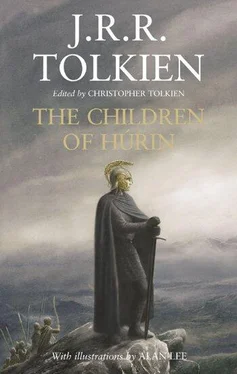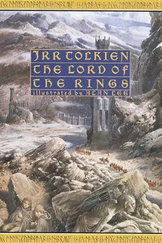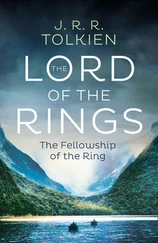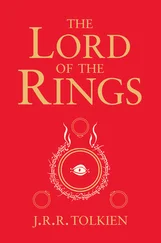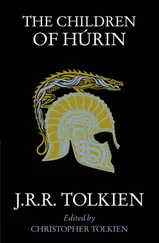‘You remember?’ said Frodo, speaking his thought aloud in his astonishment. ‘But I thought,’ he stammered as Elrond turned towards him, ‘I thought that the fall of Gil-galad was a long age ago.’
‘So it was indeed,’ answered Elrond gravely. ‘But my memory reaches back even to the Elder Days. Eärendil was my sire, who was born in Gondolin before its fall; and my mother was Elwing, daughter of Dior, son of Lúthien of Doriath. I have seen three ages in the West of the world, and many defeats, and many fruitless victories.’
Some six and a half thousand years before the Council of Elrond was held in Rivendell, Túrin was born in Dor-lómin, ‘in the winter of the year,’ as is recorded in the Annals of Beleriand , ‘with omens of sorrow’.
But the tragedy of his life is by no means comprehended solely in the portrayal of character, for he was condemned to live trapped in a malediction of huge and mysterious power, the curse of hatred set by Morgoth upon Húrin and Morwen and their children, because Húrin defied him, and refused his will. And Morgoth, the Black Enemy, as he came to be called, was in his origin, as he declared to Húrin brought captive before him, ‘Melkor, first and mightiest of the Valar, who was before the world.’ Now become permanently incarnate, in form a gigantic and majestic, but terrible, King in the northwest of Middle-earth, he was physically present in his huge fortress of Angband, the Hells of Iron: the black reek that issued from the summits of Thangorodrim, the mountains that he piled above Angband, could be seen far off staining the northern sky. It is said in the Annals of Beleriand that ‘the gates of Morgoth were but one hundred and fifty leagues distant from the bridge of Menegroth; far and yet all too near.’ These words refer to the bridge leading to the dwellings of the Elvish king Thingol, who took Túrin to be his fosterson: they were called Menegroth, the Thousand Caves, far south and east of Dor-lómin.
But being incarnate Morgoth was afraid. My father wrote of him: ‘As he grew in malice, and sent forth from himself the evil that he conceived in lies and creatures of wickedness, his power passed into them and was dispersed, and he himself became ever more earth-bound, unwilling to issue from his dark strongholds.’ Thus when Fingolfin, High King of the Noldorin Elves, rode alone to Angband to challenge Morgoth to combat, he cried at the gate: ‘Come forth, thou coward king, to fight with thine own hand! Den-dweller, wielder of thralls, liar and lurker, foe of Gods and Elves, come! For I would see thy craven face.’ Then (it is told) ‘Morgoth came. For he could not refuse such a challenge before the face of his captains.’ He fought with the great hammer Grond, which at each blow made a great pit, and he beat Fingolfin to the ground; but as he died he pinned the great foot of Morgoth to the earth, ‘and the black blood gushed forth and filled the pits of Grond. Morgoth went ever halt thereafter.’ So also, when Beren and Lúthien, in the shapes of a wolf and a bat, made their way into the deepest hall in Angband, where Morgoth sat, Lúthien cast a spell on him: and ‘suddenly he fell, as a hill sliding in avalanche, and hurled like thunder from his throne lay prone upon the floors of hell. The iron crown rolled echoing from his head.’
The curse of such a being, who can claim that ‘the shadow of my purpose lies upon Arda [the Earth], and all that is in it bends slowly and surely to my will’, is unlike the curses or imprecations of beings of far less power. Morgoth is not ‘invoking’ evil or calamity on Húrin and his children, he is not ‘calling on’ a higher power to be the agent: for he, ‘Master of the fates of Arda’ as he named himself to Húrin, intends to bring about the ruin of his enemy by the force of his own gigantic will. Thus he ‘designs’ the future of those whom he hates, and so he says to Húrin: ‘Upon all whom you love my thought shall weigh as a cloud of Doom , and it shall bring them down into darkness and despair.’
The torment that he devised for Húrin was ‘to see with Morgoth’s eyes’. My father gave a definition of what this meant: if one were forced to look into Morgoth’s eye he would ‘see’ (or receive in his mind from Morgoth’s mind) a compellingly credible picture of events, distorted by Morgoth’s bottomless malice; and if indeed any could refuse Morgoth’s command, Húrin did not. This was in part, my father said, because his love of his kin and his anguished anxiety for them made him desire to learn all that he could of them, no matter what the source; and in part from pride, believing that he had defeated Morgoth in debate, and that he could ‘outstare’ Morgoth, or at least retain his critical reason and distinguish between fact and malice.
Throughout Túrin’s life from the time of his departure from Dor-lómin, and the life of his sister Niënor who never saw her father, this was the fate of Húrin, seated immovably in a high place of Thangorodrim in increasing bitterness inspired by his tormentor.
In the tale of Túrin, who named himself Turambar ‘Master of Fate’, the curse of Morgoth seems to be seen as power unleashed to work evil, seeking out its victims; so the fallen Vala himself is said to fear that Túrin ‘would grow to such a power that the curse that he had laid upon him would become void, and he would escape the doom that had been designed for him’ ( †). And afterwards in Nargothrond Túrin concealed his true name, so that when Gwindor revealed it he was angered: ‘You have done ill to me, friend, to betray my right name, and call down my doom upon me, from which I would lie hid.’ It was Gwindor who had told Túrin of the rumour that ran through Angband, where Gwindor had been held prisoner, that Morgoth had laid a curse on Húrin and all his kin. But now he replied to Túrin’s wrath: ‘the doom lies in yourself, not in your name.’
So essential is this complex conception in the story that my father even proposed an alternative title to it: Narn e·’Rach Morgoth , The Tale of the Curse of Morgoth. And his view of it is seen in these words: ‘So ended the tale of Túrin the hapless; the worst of the works of Morgoth among Men in the ancient world.’
When Treebeard strode through the forest of Fangorn carrying Merry and Pippin each in the crook of his arm he sang to them of places that he had known in remote times, and of the trees that grew there:
In the willow-meads of Tasarinan I walked in the Spring.
Ah! the sight and the smell of the Spring in Nan-tasarion!
And I said that was good.
I wandered in Summer in the elm-woods of Ossiriand.
Ah! the light and the music in the Summer by the Seven
Rivers of Ossir!
And I thought that was best.
To the beeches of Neldoreth I came in the Autumn.
Ah! the gold and the red and the sighing of leaves in the
Autumn in Taur-na-Neldor!
It was more than my desire.
To the pine-trees upon the highland of Dorthonion I
climbed in the Winter.
Ah! the wind and the whiteness and the black branches
of Winter upon Orod-na-Thôn!
My voice went up and sang in the sky.
And now all those lands lie under the wave,
And I walk in Ambarona, in Tauremorna, in Aldalómë,
In my own land, in the country of Fangorn,
Where the roots are long,
And the years lie thicker than the leaves In Tauremornalómë.
The memory of Treebeard, ‘Ent the earthborn, old as mountains’, was indeed long. He was remembering ancient forests in the great country of Beleriand, which was destroyed in the tumults of the Great Battle at the end of the Elder Days. The Great Sea poured in and drowned all the lands west of the Blue Mountains, called Ered Luin and Ered Lindon: so that the map accompanying The Silmarillion ends in the east with that mountain-chain, whereas the map accompanying The Lord of the Rings ends in the west with the same range; and the coastal lands beyond the mountains named on that map Forlindon and Harlindon (North Lindon and South Lindon) were all that remained in the Third Age of the country called both Ossiriand, Land of Seven Rivers, and also Lindon, in whose elm-woods Tree-beard once walked.
Читать дальше
Конец ознакомительного отрывка
Купить книгу
